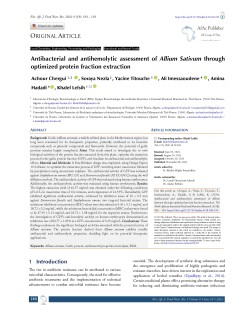Main Article Content
Antibacterial and antihemolytic assessment of Allium sativum through optimized protein fraction extraction
Abstract
Background: Garlic (Allium sativum), a widely utilized plant in the Mediterranean region, has long been renowned for its therapeutic properties, primarily attributed to its bioactive compounds such as phenolic compounds and flavonoids. However, the potential of garlic proteins remains largely unexplored.
Aims: This study aimed to investigate the in vitro biological activities of the protein fraction extracted from this plant, optimize the extraction process for the garlic protein fraction (GPF), and elucidate its antibacterial and antihemolytic effects.
Material and Methods: A Box-Behnken design was employed, using Design Expert 10 Software, to optimize the extraction process of GPF, involving water maceration followed by precipitation using ammonium sulphate. The antibacterial activity of GPF was evaluated against Staphylococcus aureus (FRI 137) and Enterococcus faecalis (ATCC49452) using the well diffusion method. The antihemolytic activity of GPF was evaluated using human erythrocytes. Additionally, the antihaemolytic activity was evaluated using human erythrocytes.
Results: The highest extraction yield of 46.57 mg/mL was obtained under the following conditions: pH of 6.22, maceration time of 102 minutes, and temperature of 24.53°C. Remarkably, GPF exhibited significant antibacterial activity, evidenced by inhibition zones of 20 ± 0.5 mm against Enterococcus faecalis and Staphylococcus aureus, two targeted bacterial strains. The minimum inhibitory concentration (MIC) values were determined as 9.36 ± 0.11 mg/mL and 18.72 ± 0.2 mg/mL, while the minimum bactericidal concentration (MBC) values were found to be 37.45 ± 0.13 mg/mL and 18.72 ± 1.08 mg/mL for the respective strains. Furthermore, the investigation of GPF's anti-hemolytic activity on human erythrocytes demonstrated an inhibition rate of 83.77 ± 1.05% at a GPF concentration of 0.25 mg/mL.
Conclusions: These findings underscore the significant biological activities associated with the protein fraction of Allium sativum. The protein fraction derived from Allium sativum exhibits notable antibacterial and antihemolytic properties, shedding light on its potential therapeutic applications.







